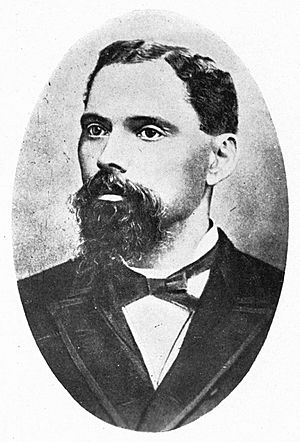Lucius Henry Holsey facts for kids
Quick facts for kids
Lucius Henry Holsey
|
|
|---|---|

Lucius Henry Holsey circa 1919
|
|
| Born | July 3, 1842 Near Columbus, Georgia, U.S. |
| Died | August 3, 1920 Atlanta, Georgia, U.S. |
Lucius Henry Holsey (July 3, 1842 – August 3, 1920) was an important American bishop. He helped lead the Christian Methodist Episcopal Church.
Early Life and Learning
Lucius Henry Holsey was born on July 3, 1842. This was near Columbus, Georgia, in the United States. His mother, Louisa, was an enslaved person. His father, James Holsey, owned the plantation where Lucius was born. This meant Lucius was born into slavery.
He was later sold to his cousin, T. L. Wynn. After that, he was sold to Richard Malcolm Johnston, who was a teacher. Some stories say that Lucius chose to be sold to Johnston. Even though he was enslaved, Lucius taught himself to read and write. Some of his family members also helped him learn. He remained enslaved by the Johnston family until slavery was ended in the United States.
Becoming a Church Leader
Lucius Holsey became a Christian after going to church meetings on the plantation. These meetings were led by Henry McNeal Turner. In February 1868, Lucius was given a special license to preach as a Methodist minister. He worked in different church roles.
In March 1873, he became a bishop of the Colored Methodist Episcopal Church. This church is now known as the Christian Methodist Episcopal Church. It was formed in 1870 for Black people. This happened during the Reconstruction era, after the American Civil War.
Holsey's Work as a Bishop
As a bishop, Holsey did many important things.
- He helped start new churches.
- He wrote and updated religious books for the church. This included the church's Book of Discipline.
- He helped manage the church's rules and activities.
- He also edited a church newspaper called The Gospel Trumpet.
Bishop Holsey worked hard to raise money for schools. He supported places like Paine College and Lane College. He also helped found the Holsey Industrial Institute in Cordele, Georgia. Another school he supported was the Helen B. Cobb Institute for Girls in Barnesville, Georgia.
At first, Holsey believed that Black and white people should work together. But later, around the year 1900, he started to support the idea of Black separatism. This meant he thought Black people should create their own separate communities and institutions.
In 1898, Holsey published a book about his life. It was called Autobiography, Sermons, Addresses, and Essays. It was printed in Atlanta, Georgia. This book was so popular that it was printed three times.
Family Life
Lucius Holsey married Harriett Turner on November 8, 1862, or 1863. Harriett was 15 years old when they got married. Her name is also sometimes written as Harriett A. Pearce or Harriet A. Turner.
Lucius and Harriett met in Hancock County, Georgia. This was during the American Civil War. Classes at the University of Georgia, where Johnston taught, were stopped because of the war. Lucius Holsey passed away on August 3, 1920. He died at his home on Auburn Avenue in Atlanta.

